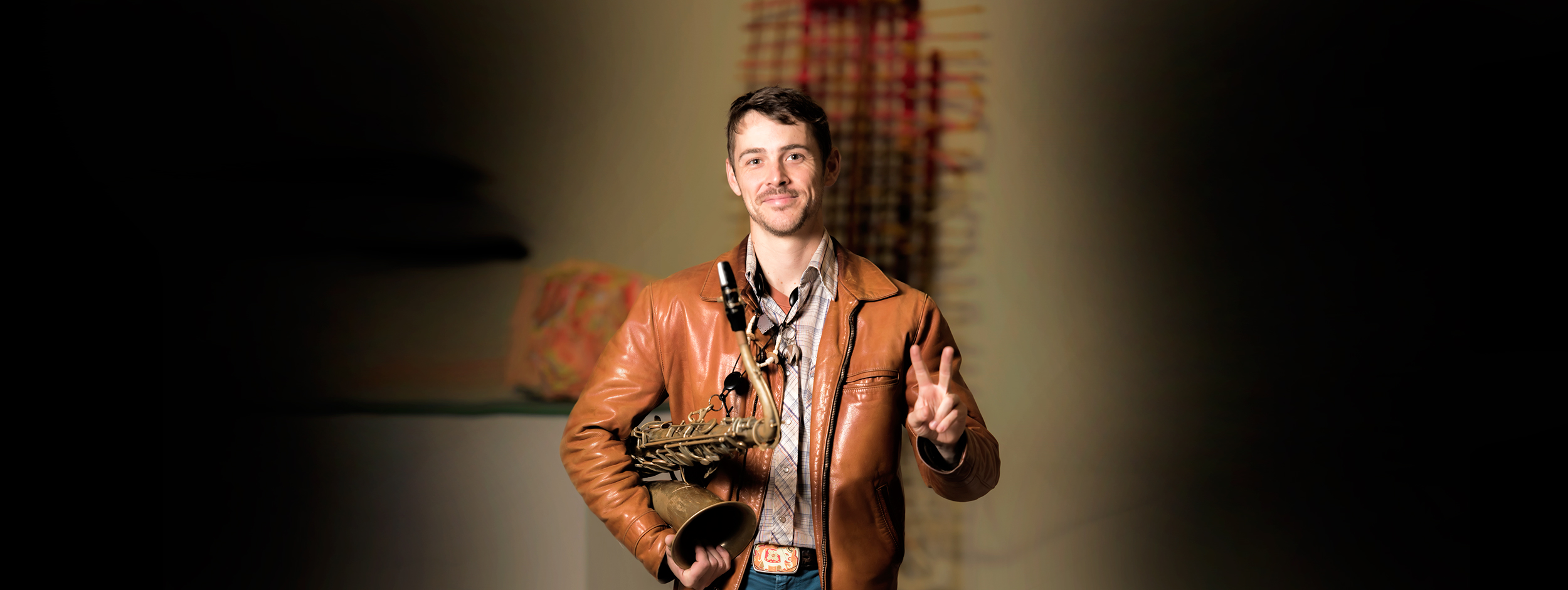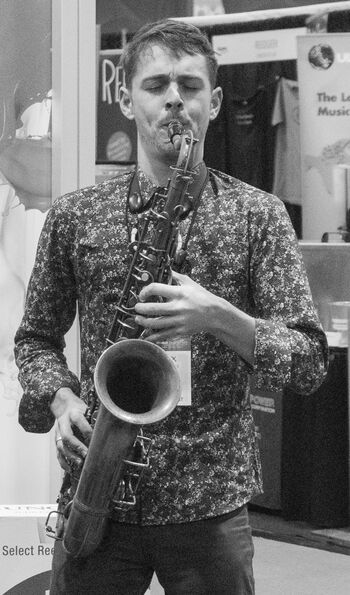Creating Your Own World Through Unaccompanied Performance: Part 1
with Patrick Breiner
Date Posted: June 19, 2017

Interview conducted by John R. Hylkema
Originally, what drew you to this type of playing?
I started listening to Evan Parker. Specifically there was a CD called Time Lapse, that really inspired me. When I mentioned it to my friend Ben Greenberg, who’s an incredible guitarist, he recommended that I check out Gianni Gebbia, who’s a wonderful Italian saxophonist and improviser. Those two guys were basically my first experiences listening to solo saxophone music that I remember, that really gripped me. They were both playing a lot of serpentine lines where it sounds like there are two or three saxophonists playing at once, but really it’s just an illusion. So basically I started wondering if I could sound like them and I started trying to practice music that would sound like the music they were playing. The answer is that I can not sound like them (chuckles). In the process of trying I started to discover other things that were working for me and started to dig deeper into those things.
What aspects of this music do you find yourself drawn to now?
It’s definitely connected back to those Evan Parker and Gianni Gebbia recordings. I’m always searching for new music to listen to that inspires me, which has largely consisted of music from other parts of the world lately. I’ve been listening to a lot of vocal music from all over the place as well as a lot of Balinese gamelan music which is incredibly inspiring. It’s really fascinating music that can be connected to something very ancient, and is still incredibly modern.
Working a lot with Travis Laplante, who leads Battle Trance, has also been incredibly inspiring. He is a saxophonist and is also a qigong practitioner and healer. I don't want to put words in his mouth, but as I understand it, for him, music and qigong essentially serve the same purpose, they’re inseparable. Music, before it was art and entertainment, was ritual and ceremonial. It was used to connect humans to the infinite, to connect people to something that is impossible to grasp and understand, that is what I’m going for. I’m going for that type of ritual, but for myself. I started in a place where I was interested in mimicking another saxophonist who I found to be particularly interesting and inspiring, but now I’m in a place where I’m actually trying to change the world.
As you focus on the things you do well, expanding and building on them, you’re actually creating your own world in which you can live. - Patrick Breiner
Keep reading...there's more.
From a performance perspective, what do you like about playing this type of music?
Having a solo piece on a recital is a really great way to push yourself physically. Unaccompanied music requires more of the performer. You don’t get to hide. For instance, you really have to cultivate your sound, your sense of time, your stage presence, because you’re totally exposed. To me, it’s a really exciting place to be because it’s so challenging. I think that’s the main reason, you’re completely exposed emotionally and physically. In addition to that, the saxophone can be a really loud instrument. It can be really forceful and really overpowering, but there are so many sounds available to me as a saxophonist that don’t really translate into a group setting. The saxophone is also capable of playing incredibly quiet, and in a group setting that’s something I rarely get to explore. Getting to explore the sound of the breath and getting to explore the instrument’s relationship with the performer’s physical body; all of those things are put on display when you perform by yourself. I think that for those reasons it’s incredibly important, not just for a saxophonist but any instrumentalist, to cultivate some kind of a solo performance so that they can explore those worlds.

Is there anything unique this particular type of music can do for someone?
One of the things it has forced me to do, in terms of developing repertoire and developing a performative presence and voice, is allow me to identify the things that I do well and to cultivate those things more deeply. I’m always looking for things that I can do naturally that maybe other people don’t gravitate toward, so I can focus on those things and develop them more deeply. As you focus on the things you do well, expanding and building on them, you’re actually creating your own world in which you can live. Not just a world in which to perform, but to exist. It might just start out with 5 seconds of material but if you spend a week developing those 5 seconds of material before you know it you’ll have 10 minutes of material. If you spend a month on those 10 minutes of material then before you know it you have a whole language that you can use for an indefinite amount of time. Even if you only know three notes on your instrument, you can start with those three notes and perform just that. So this music is really for anybody and it’s a great challenge but it’s also incredibly liberating. There’s infinite complexity in any simple sound.
Is this repertoire reserved for advanced musicians, or is there more accessible music for this type of music?
I think every musician not only can play unaccompanied music but does play unaccompanied music all the time. I’d say 90% of the time that I spend with my instrument is by myself, and I think that’s probably true with most people that play an instrument. So whether you realize it or not, you are working on unaccompanied music all the time. It’s just a matter of whether you then choose to cultivate a performance practice and a performance repertoire. I think that anybody, at any level, can perform unaccompanied music of any duration. One of my favorite things to do in workshop scenarios, especially if they’re not improvisers, is to have everyone perform a 10 to 30 second unaccompanied improvised piece of music. I think, for so many people, that’s such a terrifying concept. It's even more important for that reason.